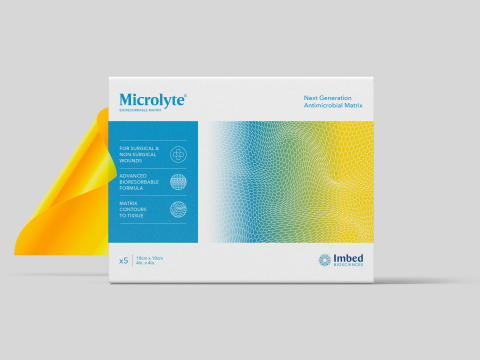Imbed Biosciences, Inc. (Imbed), a privately held biotech company emerging as a leader in advanced wound care, announced today the results of a first prospective clinical evaluation of its next-generation wound dressing, Microlyte® Matrix, in complex chronic wounds.
This press release features multimedia. View the full release here: https://www.businesswire.com/news/home/20201113005579/en/

Microlyte Matrix is the next-generation antimicrobial bioresorbable wound dressing for management of burns, surgical wounds and chronic ulcers. (Photo: Business Wire)
The study was conducted at the Wound Healing and Hyperbaric Center at Mission Hospital in Asheville, NC. Thirty-two patients with a total of 35 chronic wounds were recruited under a protocol approved by the Institutional Review Board. The wounds included venous stasis ulcers, diabetic foot ulcers, postoperative surgical wounds, burn wounds, and chronic, non-pressure lower extremity ulcers. At baseline, all wounds were nonhealing (i.e. stagnant or deteriorating) for a median of 39 weeks (range, 3–137 weeks). They were not responding to protocols of care with traditional antimicrobial dressings and antibiotics and were suspected of persistent microbial colonization prior to study inclusion.
Microlyte® Matrix was applied to wounds once every 3 days and covered with a secondary dressing. Previously prescribed protocols of care, such as debridement, compression wraps or negative pressure, were continued but prior antimicrobial dressings or antibiotics were replaced with the matrix. Three patients were excluded from the analysis due to loss to follow-up after the initial application. At 3 weeks, 72% of wounds (22/32) had significantly improved healing with an average wound area reduction of 66%. By 12 weeks, 91% of wounds (29/32) either healed completely or improved significantly with an average wound area reduction of 73%. Microlyte® Matrix was well tolerated, and no patient reported discomfort associated with the product.
“These were tough wounds. Some had not responded for months to standard of care. Microlyte® Matrix jumpstarted their healing. It was able to clear bacteria hidden on the wound tissue surface that was unaffected by traditional antimicrobial dressings”, said David Humphrey, MD, the lead clinical investigator of the study at Mission Hospital. “The matrix was easy to place on wounds with no discomfort to patients. The bioresorbable nature avoided need for its painful removal. Sustained antimicrobial activity for 3 days reduced painful dressing changes. Based on the study outcomes, I would recommend considering Microlyte® Matrix as primary antimicrobial dressing in standard protocols of care for complex wounds.”
“It is very encouraging to get such promising outcomes in deteriorating and stagnant wounds by switching to Microlyte® Matrix as the primary antimicrobial dressing”, said Michael Schurr, MD, a co-founder of Imbed and Chair of General Surgery at Mountain Area Health Education Center (MAHEC) in Asheville, NC. Dr. Schurr was not involved in the reported clinical evaluation. “Microlyte® Matrix employs 50 to 100 times less cytotoxic silver than the traditional silver dressings used in prior protocols of care for wounds in the study. It was still more effective in healing those chronic wounds. This effectiveness is associated with the ultrathin form factor of the bioresorbable matrix that contours to underlying wound surface and provides intimate contact of silver ions with microbes. These results warrant further evaluation of this antimicrobial matrix in the management of surgical wounds at risk of infection”.
“This was a very professionally run prospective clinical study. I am thankful to Dr. Humphrey and his team at MAHEC for undertaking this study and reporting the results”, said Ankit Agarwal, PhD, co-founder and CEO of Imbed. “More than fifty thousand units of Microlyte® Matrix were used on complex wounds this year. The outcomes of this clinical study reassure the choice of these clinicians in adopting Microlyte® Matrix as their preferred primary antimicrobial dressing for wounds. These results renew our commitment in educating clinicians across the world about the benefits of this next-generation wound dressing for improving outcomes in advanced wound care.”
The results are reported in this journal article: “Efficacy of a Bioresorbable Matrix in Healing Complex Chronic Wounds: An Open-Label Prospective Pilot Study”, Wounds 2020;32(11):309-318. https://www.woundsresearch.com/article/efficacy-bioresorbable-matrix-healing-complex-chronic-wounds-open-label-prospective-pilot
About Imbed Biosciences, Inc.
Imbed is a privately held biotech company registered with FDA as a medical device manufacturer with an ISO 13485 certified quality management system. The company has a portfolio of products in development based on its patented Microlyte® Matrix technology for tissue engineering to combat local pain and infections in complex wounds such as burns, chronic ulcers, surgical wounds, epidermolysis bullosa, and colorectal surgeries. The research is funded in part by a Small Business Innovation Research grant #5R44AR061913 from the National Institute of Arthritis and Musculoskeletal and Skin Diseases. For more information, please visit www.imbedbio.com and www.MicrolyteMatrix.com.
View source version on businesswire.com: https://www.businesswire.com/news/home/20201113005579/en/
Source: Imbed Biosciences, Inc.







